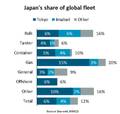FOSS
| Type | Date of Build | FlagValue | RegisterValue | Port of Regestry |
|---|---|---|---|---|
| Gen. Cargo/Container Ship | 1989-11-20 | Cyprus | LIMASSOL |
| IMO Number | Official Number | Call Sign |
|---|---|---|
| 8713653 | 8713653 | 5BNK3 |
| Legnth | Breadth | Gross tonnage | Net tonnage | Deadweight tonnage |
|---|---|---|---|---|
| 101.7 | 17.03 | 4462 | 1510 | 3727 |
FOSS Owner, Manager, Shipyard
Brodogradiliste Kraljevica d.d.
<p>Brodogradilište Kraljevica d.d. is a maritime shipyard located in Kraljevica, Croatia. This shipyard boasts a long and storied history, dating back to 1729, making it one of the oldest continuously operating
Maritime News

KAUST Research Vessel Keel Laid at Freire Shipyard
The keel laying of the new research vessel, Thuwal II, for the King Abdullah University of Science and Technology (KAUST) at the Freire Shipyard marks the beginning of a new chapter in marine research in Saudi Arabia, driving innovation in this crucial field for the country. The contract for the newbuild was announced in August 2024.“The RV Thuwal II represents a decisive step in our commitment to strengthen Saudi Arabia's scientific infrastructure and protect the Red Sea ecosystem. This new addition will open the door to high-impact technology collaborations in the region. Its commissioning promises to position Saudi Arabia as a world leader in marine research,” says KAUST.

By the Numbers: Inside Japan's Maritime Fleet
Japan is world’s third largest shipping nation as owners control 12% of the fleet“Combined, Japanese shipowners currently own 12% of the global fleet’s deadweight tonnes capacity (DWT). This makes Japan the third largest shipowning country in the world and one of only three countries where shipowners control more than 10% of the global fleet’s DWT capacity,” says Niels Rasmussen, Chief Shipping Analyst at BIMCO.The global fleet of 2.4tn DWT is owned by 16,622 shipowners in 178 countries. Of this, 604 owners, with fleets ranging in size from 115 DWT to 28.6m DWT, are from Japan.During the economic miracle of post-war Japan, the country’s international trade grew alongside the economy.

ABS' Wiernicki to Retire at the End of 2025
At the 163rd ABS Annual Members Meeting, the classification society says it has never been stronger, with substantial growth and leading safety performance reported. Key numbers in 2004 included the fleet growing to 300 million gross tons, giving it pole position in global class in global new order share with 22 percent.At the Members Meeting it was also announed that ABS Chairman and CEO Christopher J. Wiernicki will step down as Chairman and CEO and retire at the end of 2025, after 14 years at the helm of ABS.

Bayesian Salvage to Commence in May
The superyacht that sank off Sicily last year, killing British tech tycoon Mike Lynch and six others, will be lifted out of the water next month after its mast is dismantled, people close to the matter said on Tuesday.The recovery of the British-flagged Bayesian, lying on its right side at a depth of around 50 metres (164 feet), could help explain why it went down during a sudden storm off the port of Porticello, near Palermo - an event that has baffled naval experts.The salvage operation will be managed by a joint venture of Dutch companies HEBO Maritiemservice and Smit Salvage, the Italian officials, who declined to be named as they are not authorised to speak on the matter, said.

US Waters Down China Ship Fee Plans, COSCO Remains Indignant
On April 17, the Trump administration shielded domestic exporters and vessel owners servicing the Great Lakes, the Caribbean and U.S. territories from port fees to be levied on China-built vessels.The Federal Register notice posted by the U.S. Trade Representative (USTR) was watered down from a February proposal for fees on China-built ship of up to $1.5 million per port call.Ocean shipping transports about 80% of global trade - from food and furniture to cement and coal. Industry executives feared virtually every cargo carrier could face steep, stacking fees that would make U.S. export prices unattractive and foist annual import costs of $30 billion on American consumers.